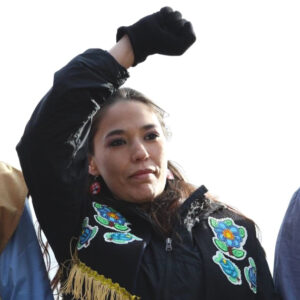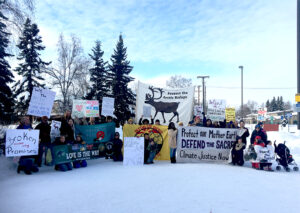
Interior steamrolls oil and gas leasing in the Arctic Refuge
On April 20, the anniversary of the Deepwater Horizon oil spill, the Interior Department began its review process for opening the Arctic National Wildlife Refuge to oil and gas leasing. Agency leaders have said that they want to fast-track the process, but haste inevitably leads to cutting corners on protecting the environment and human rights.
 Drilling poses a direct threat to the Porcupine Caribou Herd and the Gwich’in people, who rely on the herd for their food and culture.
Drilling poses a direct threat to the Porcupine Caribou Herd and the Gwich’in people, who rely on the herd for their food and culture.
The coastal plain of the Refuge provides habitat for hundreds of thousands of animals that rely on it for food and as a refuge from predators when giving birth, nursing, molting, nesting, and resting during migrations.
Sacred lands, human rights
The Gwich’in people call the coastal plain “Iizhik Gwats’an Gwandaii Goodlit” or “the sacred place where life begins.” The people making decisions about the Refuge should listen to the Gwich’in, who have lived in the Arctic and taken care of this sacred place for 40,000 years.
Bernadette Dementieff, executive director of the Gwich’in Steering Committee, told reporters on Thursday that news about the Interior beginning the leasing review process “was really heartbreaking. They are not taking our concerns and considerations to heart. Our identity, our way of life, our food security depend on the caribou.”

Bernadette Demientieff, executive director of the Gwich’in Steering Committee.
In a press statement repeated in a Washington Post article, she said, “The administration has made my people a target. We will not stand down. We will fight to protect the porcupine caribou herd … every step of the way.”
Interior must uphold environmental laws
Last year, the Secretary of the Interior said that all National Environmental Policy Act reviews should be completed in a 12 to 15 month period.
This arbitrary timeline flies in the face of what this review process entails. It flies in the face of the complexity of impacts proposed development projects have on wildlife, habitat, communities, varied economies, and the connected ecosystems and human systems. A legitimate process takes multiple years and includes extensive public and tribal involvement.
Whatever its hoped-for timeline, the Interior is required to uphold environmental laws. Trustees and our partners will scrutinize every action that Interior takes, every step of the way, to make sure environmental laws are followed and public voices are heard.

Rally for the Arctic in Fairbanks March 7, 2018.
Alaskans can speak out
During the scoping period, the agency is accepting public comments about what it should consider and analyze when developing the Environmental Impact Statement for oil and gas leasing in the Arctic Refuge. This period begins April 20 and ends June 19, 2018.
Alaskans will be able to testify at hearings and comment online and by email or mail. The hearing schedule has not yet been posted.


